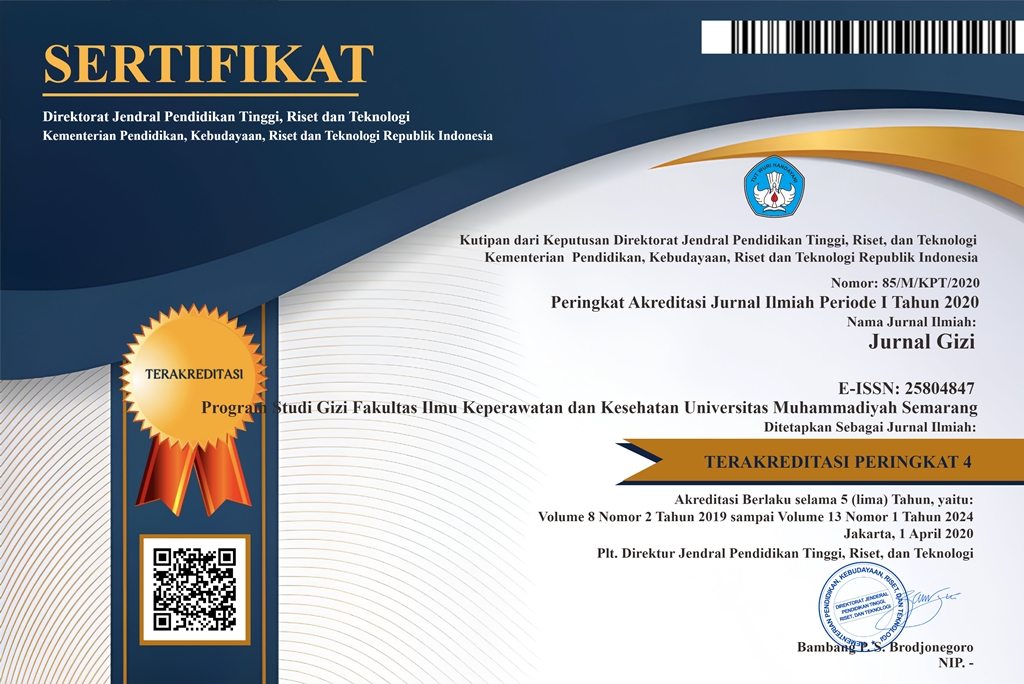Pengaruh Suhu dan Lama Penyimpanan Terhadap Kadar Vitamin C pada Jus Jambu Biji (Psidium Guajava L.)
(1) Program Studi Gizi, Jurusan Ilmu Kesehatan Masyarakat, Fakultas Ilmu Keolahragaan,Universitas Negeri Semarang, Semarang, Indonesia
(2) Program Studi Gizi, Jurusan Ilmu Kesehatan Masyarakat, Fakultas Ilmu Keolahragaan,Universitas Negeri Semarang, Semarang, Indonesia
(3) Program Studi Gizi, Jurusan Ilmu Kesehatan Masyarakat, Fakultas Ilmu Keolahragaan,Universitas Negeri Semarang, Semarang, Indonesia
(*) Corresponding Author
Abstract
Guava juice is one of the healthiest drinks and can be used as a healthy snack. However, people tend to wait for a certain period of time to consume juice. This can affect the levels of vitamin C in it. The purpose of this study was to identify the effect of temperature and storage time on vitamin C levels in guava juice (Psidium guajava L.). The research design was a factorial randomized block design (RAK) with a 2 x 3 pattern, which consisted of two factors, namely: The influence of storage temperature
which consisted of 2 levels, namely cold temperature (6.6 -10°C) and room
temperature (28 -32 °C) and the storage time factor consisted of 3 levels, namely 30 minutes, 60 minutes, and 90 minutes so that the total treatment in this study amounted to 6 treatments. Analysis of vitamin C in this study used the UV-VIS spectrophotometry method. Each treatment will be repeated measurements of vitamin C levels 3 times. The data that has been obtained were analyzed using the Friedmann test with the Mann
Whitney advanced test (CI = 95%). The results showed that there was an interaction between the combination of temperature and storage time which significantly affected the decrease in vitamin C levels in guava juice (Psidium guajava L.). The lowest vitamin C content in guava juice (Psidium guajava L.) was found in the L2S2 treatment, namely storage at room temperature with a storage time of 60 minutes. In waiting for consumption, people should store fruit juice in the refrigerator so that the vitamins they get are more optimal.
Keywords: Vitamin C, Fruit Juice, Guava, Temperature, Storage Time, Spectrophotometry.
which consisted of 2 levels, namely cold temperature (6.6 -10°C) and room
temperature (28 -32 °C) and the storage time factor consisted of 3 levels, namely 30 minutes, 60 minutes, and 90 minutes so that the total treatment in this study amounted to 6 treatments. Analysis of vitamin C in this study used the UV-VIS spectrophotometry method. Each treatment will be repeated measurements of vitamin C levels 3 times. The data that has been obtained were analyzed using the Friedmann test with the Mann
Whitney advanced test (CI = 95%). The results showed that there was an interaction between the combination of temperature and storage time which significantly affected the decrease in vitamin C levels in guava juice (Psidium guajava L.). The lowest vitamin C content in guava juice (Psidium guajava L.) was found in the L2S2 treatment, namely storage at room temperature with a storage time of 60 minutes. In waiting for consumption, people should store fruit juice in the refrigerator so that the vitamins they get are more optimal.
Keywords: Vitamin C, Fruit Juice, Guava, Temperature, Storage Time, Spectrophotometry.
Full Text:
PDFArticle Metrics
Abstract view : 1366 timesPDF - 599 times
DOI: https://doi.org/10.26714/jg.12.1.2023.37-45
Refbacks
- There are currently no refbacks.

This work is licensed under a Creative Commons Attribution 4.0 International License.
Diterbitkan oleh: Program Studi Gizi (D3 dan S1)
Fakultas Ilmu Keperawatan dan Kesehatan
Universitas Muhammadiyah Semarang
Sekretariat: Jl. Kedungmundu Raya No. 18 Semarang
Contact Person : Hapsari Sulistya Kusuma, S.Gz, M.Si (+62 85 6 41 536 553)

This work is licensed under a Creative Commons Attribution 4.0 International License.









.png)
.png)